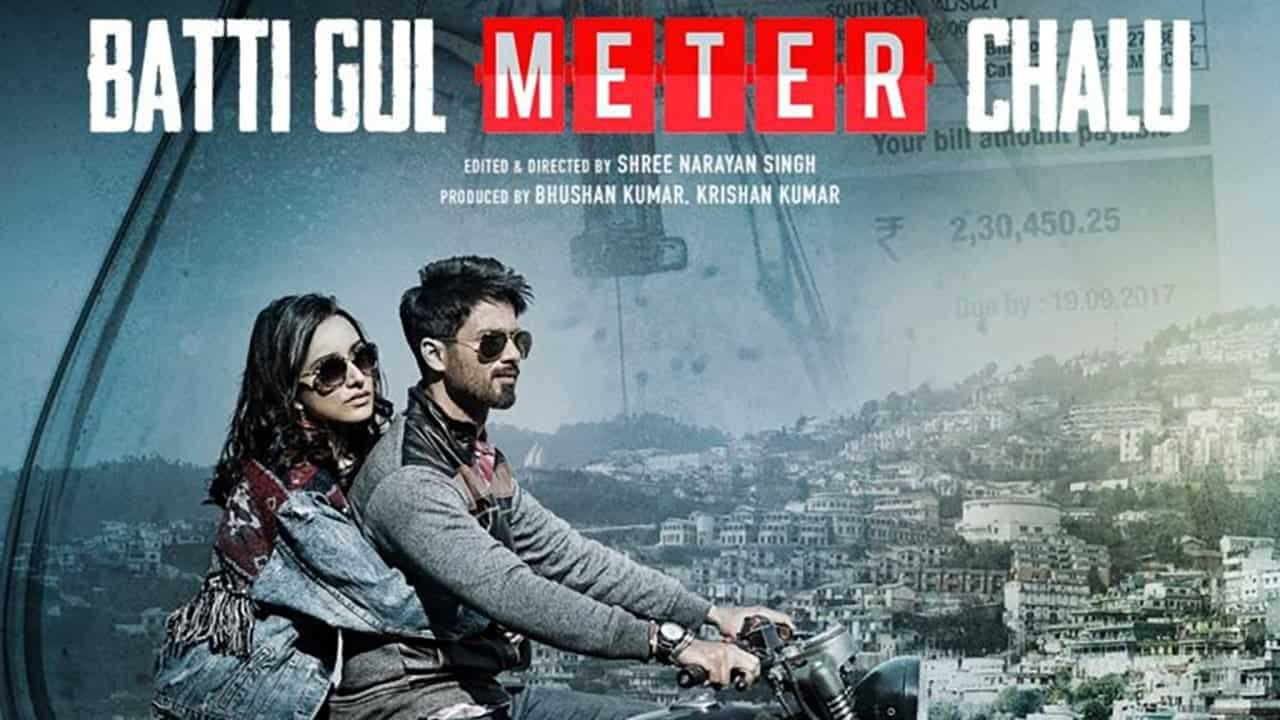
Batti Gul Meter Chalu is a poignant and socially relevant Bollywood film directed by Shree Narayan Singh. Released in 2018, the film stars Shahid Kapoor, Shraddha Kapoor, Divyendu Sharma, and Yami Gautam in key roles. The movie addresses the critical issue of electricity theft and exorbitant electricity bills in rural India, while also weaving a compelling narrative about friendship, love, and justice.
Batti Gul Meter Chalu the Story
The story is set in a small town in Uttarakhand, where electricity problems are a part of daily life. The plot centers around three childhood friends: Sushil Kumar Pant, known as SK (Shahid Kapoor), Lalita Nautiyal, nicknamed Nauti (Shraddha Kapoor), and Sundar Mohan Tripathi (Divyendu Sharma). Their bond is strong, filled with camaraderie, playful banter, and shared dreams. However, their lives take a dramatic turn when an unexpected crisis hits.
Sushil Kumar Pant (SK)
SK is a lawyer who is smart, witty, and somewhat unscrupulous. He uses his legal acumen to exploit loopholes and make easy money. Despite his questionable ethics, SK is a loyal friend and cares deeply for Nauti and Sundar. His character undergoes significant development throughout the film, transforming from a self-centered individual to a crusader for justice.
Lalita Nautiyal (Nauti)
Nauti is a spirited and independent fashion designer with a zest for life. She dreams of making it big in the fashion industry and is fiercely loyal to her friends. Her relationship with SK and Sundar adds depth to the narrative, providing a blend of romance and conflict.
Sundar Mohan Tripathi
Sundar is the most sincere and straightforward of the trio. He owns a small printing press and is an honest businessman. His life revolves around his friends and his work until he becomes a victim of a corrupt system.
The Catalyst: Exorbitant Electricity Bills
The central conflict of the story arises when Sundar receives an astronomical electricity bill of ₹1.5 million (15 lakhs). Despite his modest business, the bill is outrageously high, and Sundar’s attempts to rectify it lead to frustration and despair. The electricity company, SPTL, refuses to acknowledge the mistake, leaving Sundar helpless.
Sundar’s Tragic Fate
Unable to bear the stress and humiliation, Sundar takes a drastic step and commits suicide. His death shakes SK and Nauti to their core. The tragedy becomes a turning point for SK, who decides to fight against the corrupt electricity company and seek justice for his friend.
The Fight for Justice
SK’s transformation from a self-serving lawyer to a determined advocate for social justice is the heart of the film. He takes on the electricity company in court, representing Sundar’s family and the countless other victims of fraudulent billing practices. Yami Gautam plays the role of Gulnaar Rizvi, the opposing counsel representing SPTL.
The Courtroom Drama
The courtroom scenes are intense and gripping, showcasing SK’s legal prowess and determination. His arguments are based on the principles of justice and fairness, highlighting the systemic corruption and negligence of the electricity company. The legal battle is not just about Sundar’s case but also about setting a precedent for others facing similar issues.
The Power of Community
Throughout the film, the support of the local community plays a crucial role. The townspeople rally behind SK, providing evidence and testimonies that expose the company’s malpractices. This collective effort underscores the importance of community solidarity in the face of injustice.
Themes and Messages
Batti Gul Meter Chalu addresses several important themes, making it a thought-provoking and socially relevant film.
Corruption and Injustice
The film sheds light on the rampant corruption within the electricity sector, where inflated bills and unethical practices exploit ordinary citizens. It calls for accountability and reforms to protect consumers’ rights.
Friendship and Loyalty
The deep bond between SK, Nauti, and Sundar is central to the narrative. Their friendship is tested by tragedy but ultimately becomes the driving force behind the quest for justice. The film portrays how true friendship can inspire change and provide strength in difficult times.
Empowerment and Advocacy
SK’s journey from a self-interested lawyer to a champion for social justice illustrates the power of personal transformation and advocacy. The film encourages individuals to stand up against wrongdoing and fight for their rights, no matter how daunting the challenge.
Rural Struggles
The setting of the film in a small town highlights the unique challenges faced by rural communities in India. Issues like unreliable electricity supply and bureaucratic apathy are depicted realistically, bringing attention to the need for better infrastructure and governance.
Key Moments and Highlights
The Friendship Triangle
The dynamics between SK, Nauti, and Sundar provide both emotional depth and comic relief. Their playful interactions and genuine affection for each other create a strong foundation for the film’s more serious moments.
Sundar’s Desperation
Sundar’s struggle with the electricity company is portrayed with sensitivity, capturing his growing desperation and helplessness. His suicide is a powerful and tragic moment that serves as a catalyst for the story’s progression.
SK’s Transformation
SK’s character development is one of the film’s most compelling aspects. His shift from exploiting legal loopholes to becoming a voice for justice is portrayed convincingly by Shahid Kapoor, adding layers to his character.
The Courtroom Climax
The courtroom scenes are a highlight, filled with tension and drama. SK’s passionate arguments and the unveiling of evidence against the electricity company make for a gripping narrative. Yami Gautam’s performance as the opposing counsel adds to the intensity of these scenes.
The Final Verdict
The film’s climax delivers a satisfying resolution, with the court ruling in favor of Sundar’s family and ordering the electricity company to compensate them. This victory is not just legal but also moral, symbolizing the triumph of justice over corruption.
Impact and Reception
Batti Gul Meter Chalu received praise for its relevant social message and strong performances, particularly by Shahid Kapoor and Divyendu Sharma. The film’s blend of drama, humor, and social commentary resonated with audiences, making it both entertaining and thought-provoking.
Critical Acclaim
Critics lauded the film for tackling a pertinent issue with sensitivity and realism. The screenplay, direction, and performances were highlighted as strengths. However, some critics felt that the film’s pacing could have been tighter, particularly in the second half.
Audience Response
Viewers appreciated the film’s honest portrayal of the struggles faced by ordinary people due to corruption and bureaucratic inefficiency. The relatable characters and engaging storyline made it a hit among the audience, who found the film’s message both inspiring and relevant.
CLICK HERE TO WATCH THE FULL MOVIE
Conclusion: A Call for Change
Batti Gul Meter Chalu is more than just a film; it is a call for social awareness and change. By addressing the pressing issue of electricity theft and exorbitant billing, it highlights the need for accountability and reforms in essential services. The film’s portrayal of friendship, loyalty, and the fight for justice provides a powerful and emotional narrative that resonates with viewers.
In essence, Batti Gul Meter Chalu is a celebration of the human spirit’s resilience and the importance of standing up against injustice. It encourages individuals to take a stand, advocate for their rights, and support each other in times of need. The film serves as a reminder that even in the face of overwhelming odds, justice and fairness can prevail through determination, solidarity, and the power of community.
